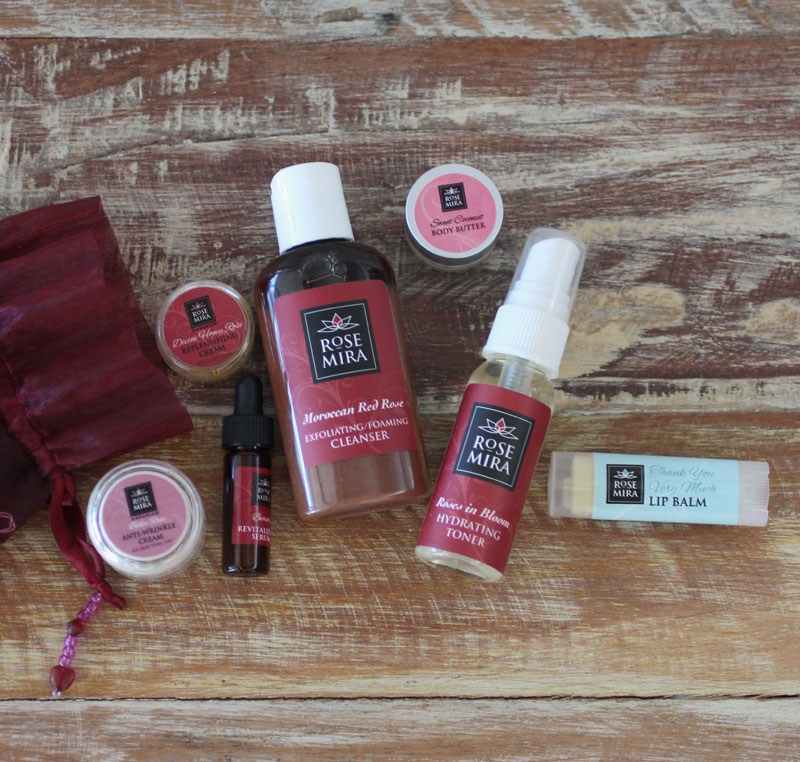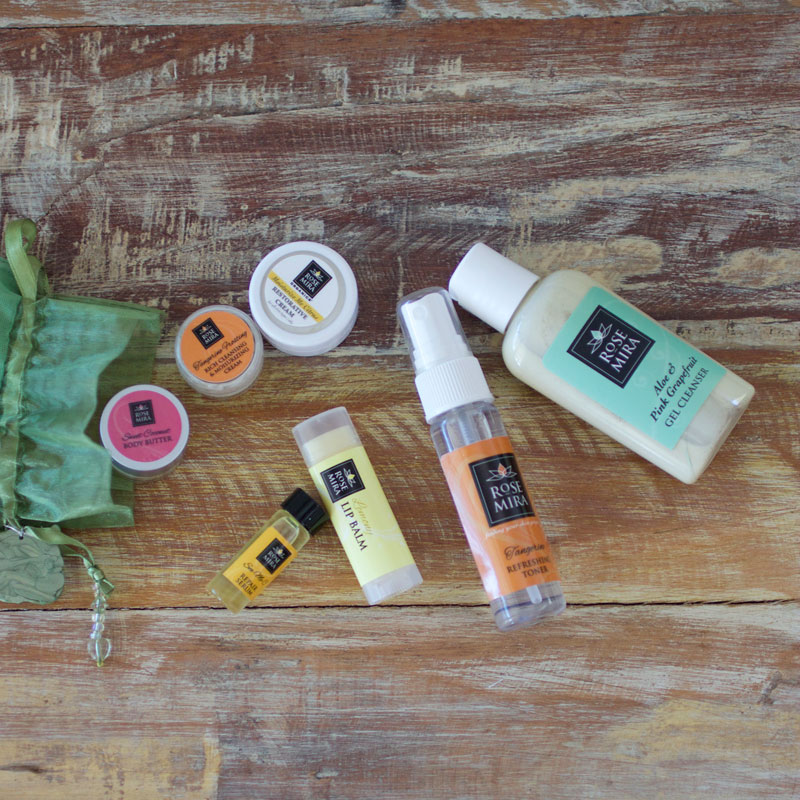Have you ever taken a stroll down the skin care aisle of a pharmacy or health food store? The shelves are stocked with bottles of all shapes, colors and sizes; all stamped with a promise to deliver soft, youthful skin to purchasers. But how do you know what the right solution is for you? And can you actually be confident that the skin care products you purchase contain safe ingredients? Skin care can certainly be overwhelming. That's why I am sharing this interview with Mira Herman, Acupuncturist, Chiropractor, Herbalist and founder/formulator at Rosemira. Rosemira is a skin care company dedicated to providing artisanal, handcrafted, organic skin solutions. Mira recently sat down to answer some questions about navigating skincare, specifically in the winter months. Read on for some very good advice.

1. I’ve had a hard time keeping a “serious” regimen for skin. What’s actually necessary?
This is a great question and one that all of us grapple with at one time or another. As with any routine, it has to fit our personality. Some people like to exercise 30 minutes every day, while others prefer a longer workout three times a week. Some have an affinity for running, while others prefer Tai Qi or Yoga. Expecting ourselves to participate in a form of exercise with which we don’t resonate will most likely result in failing to remain consistent and achieve the results we want. Sometimes it’s just a matter of starting gently with something you enjoy. As you build momentum and the results become noticeable, it gets easier to maintain and the once forced regimen becomes a simple habit. The same goes for skincare habits.
First and foremost, regardless of how simple or complex you’d like to be in your routine, start by removing all products containing harmful ingredients. Harmful ingredients are not harmful for your skin alone but for your body as a whole. Products with synthetic ingredients, toxic preservatives, additives, fillers and dyes, alcohol and added fragrances. (You would not want to eat foods laced with herbicides, or food shot with chemicals to speed up the ripening process during transport.) Similarly, you want to provide your skin with a healthy diet. How healthy and how extremely vigilant you are is entirely up to you. And this is not age dependent. After all, it’s important to eat a healthy diet and exercise at any age. We don’t start brushing our teeth when they begin falling out. In the same way a consistent skincare regimen should be started early on and maintained as a habit throughout one’s life. It should be one of our base habits, with only the degree of complexity of the regimen and the number or type of products used changing when we face different challenges as we mature.
For a simple regimen that gets results, the basic products required at the least are: a gentle non-stripping cleanser like a Cleansing Milk or Gel Cleanser, a Toner (only Hydrosol based, no alcohol), Serum and Moisturizing Cream (day, night or either), and an Eye Cream. If that is all you can do initially, it will definitely keep your skin happy and healthy. And if you are using foundation, remove it immediately upon getting home, allowing your skin to breathe.
Of course then we have to modify our regimen to fit our skin types or challenges, but I do believe most skin challenges are really skin out of balance and as our regimens become more balanced across our habits- eating, drinking water, exercising, meditating, having fun - the skin will be brought into balance as well.
2. How can you safeguard your skin in cold weather?
Hydrate inside and out. Drink lots of water and use a Hydrosol Toner several times a day. While it feels natural to use a Toner more frequently during the summer months to refresh, cool and hydrate, it is particularly important during cold and dry months. Follow the Toner with a Moisturizing product such as a Serum and/or Moisturizing Cream. The most important Moisturizing product I’d recommend is a truly moisturizing cream. By ‘truly’ I mean a cream that isn’t filled with damaging, drying ingredients like alcohol (all alcohols), but rather with healthy, nourishing ingredients to support your skin’s inherent moisture. Apply the Moisturizing Cream right after the Toner and while your skin is still slightly moist.
And let's not forget that we have skin over our entire bodies. In the winter, it is particularly important to use a Body butter or a rich body lotion (not a water based, thin and fast absorbing lotion) on a daily basis, preferably after a shower or bath while your skin is still slightly damp. When you moisturize your body from an early age, the results of this one habit will become increasingly noticeable as we age.

3. My hands are looking wintery right now. That’s the best way I can explain it. How can I put the sparkle back in my weatherized skin?
This goes back to my previous answer. We have to put attention to our hands, feet, and everything in between. I guarantee that if you use one of our butters: Sweet Coconut Body Butter, Alluring Jasmine Body Butter, or another rich body lotion on a regular basis, you will be amazed at the results.
Whether it’s just winter dryness, or if you suffer from a medical condition such as hypothyroid, your skin will feel smooth and soft and will look alive with this simple addition to your routine. And for those of us who are willing to put in a little more effort, using a salt, sugar or other exfoliating body scrub will rejuvenate your skin and stimulate lymph and blood circulation, to promote inner youth and thus, an outer more youthful appearance. No more weatherized, leathery skin.
4. Are there any Superfoods you suggest for skin?
The health of our gut is one of the most important aspects to a healthy body and skin. Probiotics, in particular, are arguably more crucial than any other nutritional supplement, because they support digestion, enabling our bodies to absorb the nutrients from the rest of our foods more efficiently and thoroughly.
- Nuts and seeds are essential to health, particularly almonds, which are more alkaline-forming than other nuts and are rich in vitamin E, amino acids, and calcium. Walnuts are wonderful too. Pumpkin Seeds are the most alkaline-forming among seeds, and are a rich source of protein, iron, magnesium, potassium, biotin and omega 3 fatty acids.
- Green leafy foods such as spinach, broccoli, kale, watercress and collards are rich in vitamins A, C, E, K and B, as well as iron. In green foods, these nutrients are more readily available and easily absorbed. Spirulina, a dark green seaweed is great source of biotin, protein, iron and vitamin B12.
- Orange root vegetables such as sweet potatoes, carrots, pumpkins and winter squash are rich in vitamins A and C, important specifically for the health of nails, skin and hair.
- Old fashioned, rolled oats or steel cut oats are a very inexpensive superfood. They provide protein, biotin and other B vitamins, plus magnesium and potassium, fiber and antioxidants. A lot to get from one food.
- Berries are also wonderful antioxidant foods and rich in vitamins. Among them, acai berries, blueberries, raspberries, kiwis and noni berries are rich sources of Vitamins A, C, and E.
- Dark chocolate, not just any chocolate. Chocolate with high flavanol content and 60% cacao helps skin stay hydrated and protects it from sun damage.
There are many other foods that are important for our general health and the health of our skin in particular. Remember, most importantly, to eat healthy non-processed foods and don’t stick to one food. When eating berries, don’t stick to one type only; eat a variety. Same goes for nuts, seeds, greens, etc.
